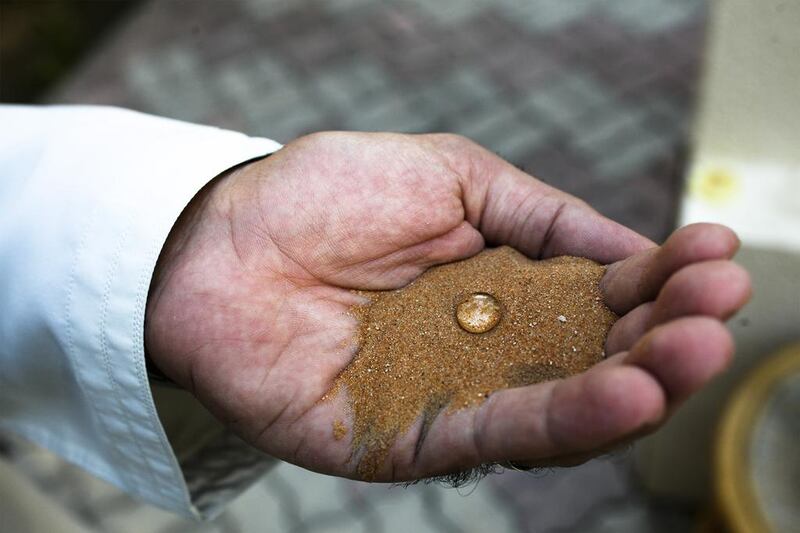ABU DHABI // Hydrophobic sand produced in Al Ain could save thousands of gallons of water in agriculture.
The sand, which costs Dh250 per tonne, is non-absorbent and water cannot penetrate it, offering numerous benefits to groundwater reserves and pollution levels.
“It stops the water from percolating to the groundwater or to lower soils below where the roots are,” said Fahad Hareb, the chief executive at Desalt Innovation Middle East, which owns the factory producing the sand. “It also stops the rising effect of groundwater, which brings with it a lot of salt to the surface and the soil.”
Instead of irrigating landscape and crops for 40 minutes a day with sprinklers, which is common in the Arabian Gulf, the company has managed to reduce watering time to two minutes.
“You apply the irrigation system over the sand, and the sweet soil acts as a sponge to capture the water,” said Mr Hareb, an Emirati. “As you pour the water into the soil, some of it gets captured but, over time, most of it gets lost as continuous movement down the soil and that’s how you lose water.
“In some areas in Abu Dhabi, we found 75 per cent of water savings because you have no water loss through percolation.”
The system, which can last up to 30 years, also helps with soil salinity.
“We have a capillary rising effect here,” he said. “So we’re stopping the groundwater from rising up as it carries a lot of salt and rises up through the soil. This is an issue because you need a lot of water to keep the salinity levels low, so we’re also protecting the groundwater from salt contamination.
“People say they can use a plastic bag instead, but there will be a lot of fungus and bacteria growth because you stop the natural circulation of oxygen and gases in the soil.”
The project started in 2006 with Mr Hareb’s German partner, Helmut Schulze, who invented the liquid additive. Mr Hareb invested in the product after he saw a lot of potential for its use in the UAE.
“It requires a mixing process with the material to be used and we found that the Al Ain desert sand was a very good source of potential product to mix the additive with,” he said. “This is because it’s a multigrain sand so it compacts really well, which makes it ideal.”
Two years later, a factory was set up and huge projects were outlined. But the 2008 financial crisis halted most of them.
UAE University has since performed tests over a two-year period to ensure the additives were not harmful. Results were successful.
“They found roots were 20 per cent denser and the harvest came out 33 per cent heavier, which was really positive,” said Mr Hareb. “So the plants were not only surviving, they were actually thriving and growing nicely.”
The university has grown alfalfa, rice, tomatoes and lettuce in two greenhouses.
“They also used the soil as a source of research to allow students to get their PhD on its study,” he said. “We also did work in Dubai Investment Park to protect substations from groundwater.”
The sand has drawn international interest from Australia, Canada, Tunisia, Algeria and Germany, where it is currently being used as tile grout.
Mr Hareb hopes to expand more into Abu Dhabi.
“There are a lot of issues in some areas where you have a lot of salt coming from the ground eating into the interlock of villas,” he said. “We’re also looking at flood protection abroad.”
Experts say the system must be economically viable to be worthwhile.
“Evaporation and other losses like drainage are significant issues,” said Nicholas Lodge, managing partner of Clarity, an Abu Dhabi-based agriculture consultancy. “Possibly in the right usage, it could be helpful, although other limiting factors, such as high temperature and low nutrient levels, make most forms of cultivation or farming in arid, sandy regions such as here, questionable in terms of economics, the environment and use of scarce resources.”
cmalek@thenational.ae





